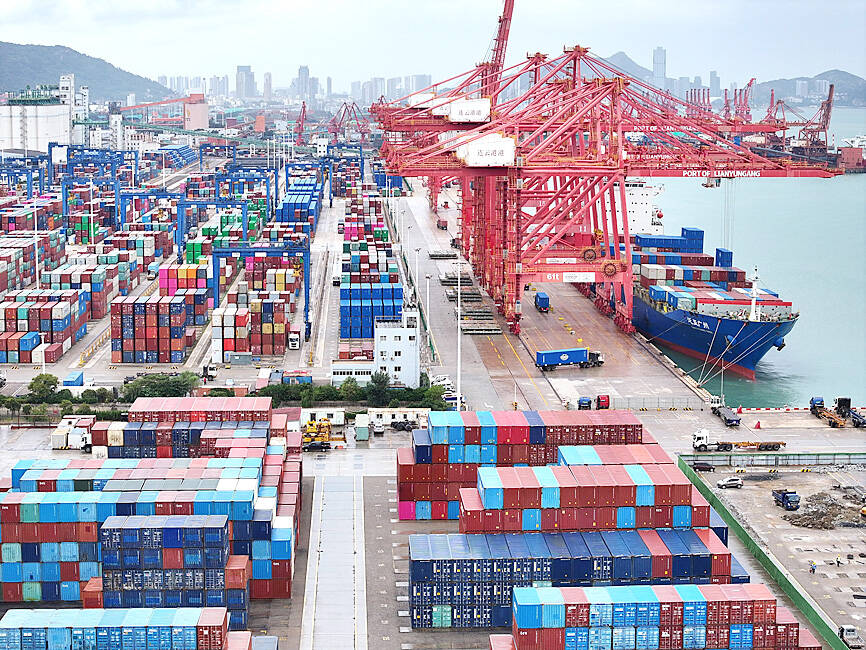Foreign buyers are the primary source driving shipbuilding production in China, with Taiwan-based Evergreen Marine Corp (長榮海運) being one of them especially concerning, the Center for Strategic and International Studies (CSIS) said.
In its 69-page report Ship Wars: Confronting China’s Dual-Use Shipbuilding Empire published on Tuesday last week, the Washington-based think tank said much of the production was carried out at tier-1 and tier-2 shipyards.
The CSIS study categorizes each of the 307 Chinese shipyards active from 2019 to last year into four tiers that reflect their degree of integration with China’s military industrial ecosystem, with tier-1 being “very high risk” while tier-2 means “lower risk.”

Photo: Reuters
‘STRIKING’
More than 75 percent of the production at these shipyards were sold to for firms based outside of China or Hong Kong, including US military allies such as Denmark, France, Japan, South Korea, and most strikingly Taiwan, the CSIS said.
“Taiwan’s position as a top client of China’s naval shipyards is particularly striking, given the direct threat the PLAN’s [Chinese People’s Liberation Army Navy] rapid expansion poses to the island’s security,” it said.
Citing Evergreen, the largest container cargo shipper in Taiwan, the CSIS said that 15 percent of its active fleet was built at tier-1 shipyards, with more on order.
RISKS
Many of those orders have gone to tier-1 shipyards such as Hudong-Zhonghua and Jiangnan, which are the same facilities that produce warships explicitly designed to support the PLAN in conducting amphibious assaults or other military operations across the Taiwan Strait, it added.
While companies buy vessels from China due to their lower costs, “governments should balance the potential benefits of cost savings with the risk of contributing to China’s naval development,” the CSIS said.
Tier-1 shipyards receive substantial state funding and contracts, ensuring a steady stream of resources to fuel rapid production, the think tank said.
As such, “these dual-use facilities blur the line between commercial and military activity, leveraging their infrastructure and output to accelerate naval production,” it added.
The CSIS advised Washington to encourage its allies to take quiet, informal actions to discourage their companies from buying from tier-1 shipyards.
“This is particularly true of Taiwan, as it stands to lose the most from China’s ongoing naval modernization,” it said.

DEFENSE: The National Security Bureau promised to expand communication and intelligence cooperation with global partners and enhance its strategic analytical skills China has not only increased military exercises and “gray zone” tactics against Taiwan this year, but also continues to recruit military personnel for espionage, the National Security Bureau (NSB) said yesterday in a report to the Legislative Yuan. The bureau submitted the report ahead of NSB Director-General Tsai Ming-yen’s (蔡明彥) appearance before the Foreign and National Defense Committee today. Last year, the Chinese People’s Liberation Army (PLA) conducted “Joint Sword-2024A and B” military exercises targeting Taiwan and carried out 40 combat readiness patrols, the bureau said. In addition, Chinese military aircraft entered Taiwan’s airspace 3,070 times last year, up about

A magnitude 4.3 earthquake struck eastern Taiwan's Hualien County at 8:31am today, according to the Central Weather Administration (CWA). The epicenter of the temblor was located in Hualien County, about 70.3 kilometers south southwest of Hualien County Hall, at a depth of 23.2km, according to the administration. There were no immediate reports of damage resulting from the quake. The earthquake's intensity, which gauges the actual effect of a temblor, was highest in Taitung County, where it measured 3 on Taiwan's 7-tier intensity scale. The quake also measured an intensity of 2 in Hualien and Nantou counties, the CWA said.

The Overseas Community Affairs Council (OCAC) yesterday announced a fundraising campaign to support survivors of the magnitude 7.7 earthquake that struck Myanmar on March 28, with two prayer events scheduled in Taipei and Taichung later this week. “While initial rescue operations have concluded [in Myanmar], many survivors are now facing increasingly difficult living conditions,” OCAC Minister Hsu Chia-ching (徐佳青) told a news conference in Taipei. The fundraising campaign, which runs through May 31, is focused on supporting the reconstruction of damaged overseas compatriot schools, assisting students from Myanmar in Taiwan, and providing essential items, such as drinking water, food and medical supplies,

New Party Deputy Secretary-General You Chih-pin (游智彬) this morning went to the National Immigration Agency (NIA) to “turn himself in” after being notified that he had failed to provide proof of having renounced his Chinese household registration. He was one of more than 10,000 naturalized Taiwanese citizens from China who were informed by the NIA that their Taiwanese citizenship might be revoked if they fail to provide the proof in three months, people familiar with the matter said. You said he has proof that he had renounced his Chinese household registration and demanded the NIA provide proof that he still had Chinese